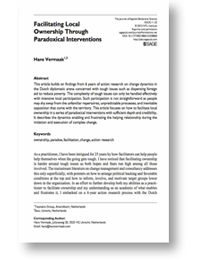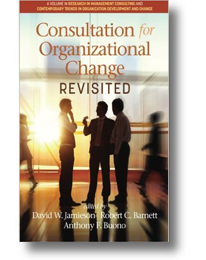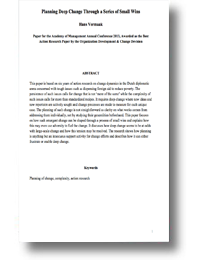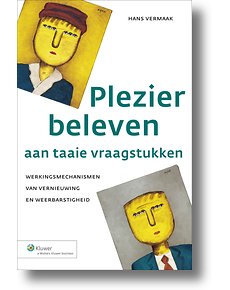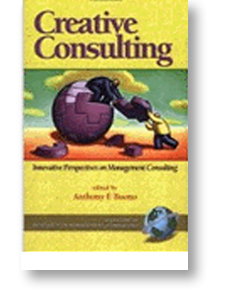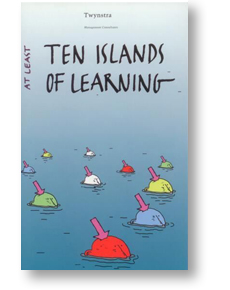The complexity of tough issues can only be handled effectively with intensive local participation. Such participation is not straightforward as people may shy away from the unfamiliar repertoires, unpredictable processes and inevitable opposition that come with the territory. This paper focuses on how to facilitate local ownership in a series of paradoxical interventions with sufficient depth and credibility. Read more…
publications
Facilitating local ownership through paradoxical interventions
Democratization of change management
In 2018 four established consultants and change experts in their (late) thirties came to interview me for the Dutch national magazine for management consultants. (The Netherlands seems to have the highest density of such consultants in the world, by the way). They were looking for a good conversation about change as profession, democratization of change agents, professional standards and how to evaluate your own performance honestly Read more…
Knowing yourself as a change agent
In: D. W. Jamieson, Barnett & A Buono (eds.) Consultation for Organizational Change Revisited - Information Age Publishing, 2016
This chapter presents a questionnaire that measures individual change preferences based on a meta-theory of five paradigms of change. We describe its construction and improvement over a 13-year period, during which time more than 100,000 people have used the test as an instrument for self-reflection.
Read more…
Planning deep change through a series of small wins
Complex issues require continuous change that is planned incrementally. This paper focuses on how such emergent change can be shaped through a process of small wins and explains how this may even use adversity to fuel the change. The research shows how planning is anything but an innocuous support activity for change efforts and describes how it can either frustrate or enable deep change. Read more…
A springboard for further learning
In: S.M. Adams, A. Zenzi (eds.) Preparing Better Consultants: The Role of Academia. Information Age Publishing, 2011
The challenges consultants face warrant ongoing education. When those practitioners have 15- 30 years of experience dealing with messy realities, however, it makes little sense for faculty to teach clean-cut models in standardized curricula. Read more…
Book summary ‘Enjoying tough issues’
Dynamics of innovation and stagnation
There is no shortage of tough issues: whether it is collaboration between professionals, external oriented government, sustainable economy or development cooperation. They are characterized by complexity of different kinds: many factors and many actors are involved. It makes tough issues hard to pin down and impossible to eradicate. The dominant change repertoires are ill equipped for tough issues: clear division of tasks and responsibilities, minimizing conflicts, drawing up organizational missions, rolling out large-scale change programs Read more…
Comparing psychotherapists’ and change agents’ approaches to change
In: A. Buono (ed.) Creative Consulting: Innovative Perspectives on Management Consulting - Information Age Publishing, 2004
In this chapter we explore the most prominent clusters of theories for changing organizations and changing people. Managers and management consultants make use of the first set of theories while psychotherapist use the latter. Our assumption was that there would be considerable overlap between these sets of theories. Read more…
At least ten islands of learning
In Search of Corporate Learning
People learn, all the time and everywhere. Yet it seems we all have our own images and ideas about what learning actually is. More importantly, we all seem to have our favourite approaches to learning, which we call upon whenever a learning situation arises. Read more…




